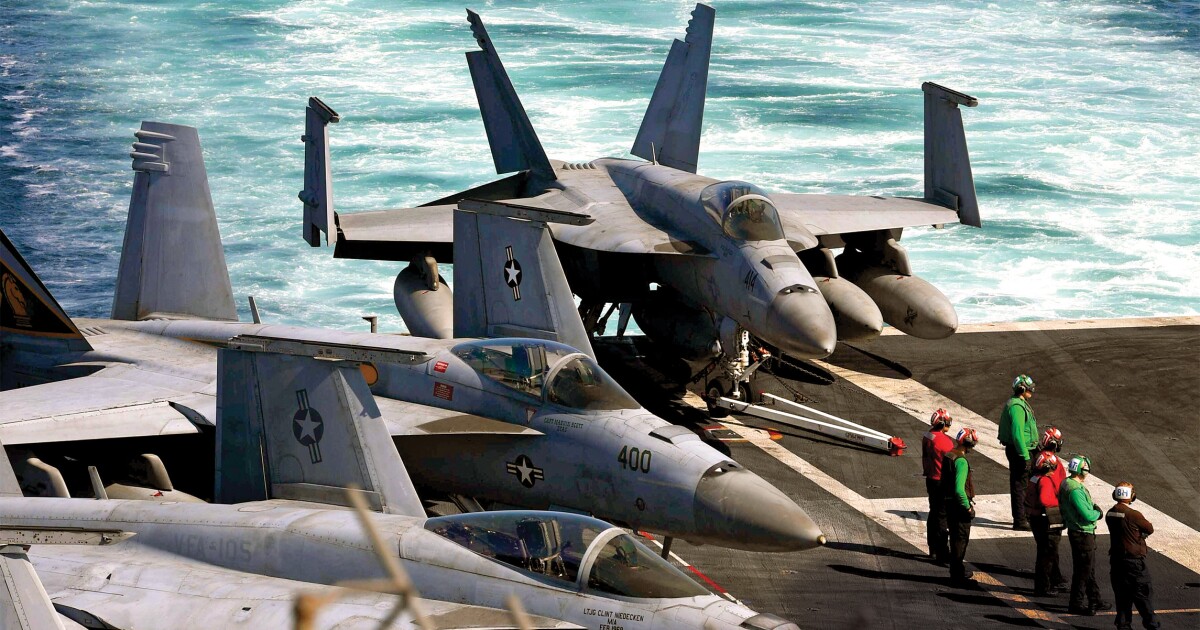

When Hamas murderers paraglided and swept across the border between Gaza and Israel on Oct. 7, veteran Middle East watchers were immediately convinced what they were seeing was the horrific manifestation of Iran’s malevolent terrorist ideology.
Particularly as the gruesome images and details emerged — the gunning down of civilians in the streets and at a music festival; the burning of families, including the elderly and very young, in their homes; the raping, torturing, and mutilating of women; and ultimately, the slaughtering of 1,200 Israelis, including 32 Americans, and the abduction of more than 240 hostages.
MILITARY PILOTS GETTING UPDATED EYEWEAR TO PROTECT AGAINST INCREASING LASER THREATS
“The Ayatollah Khamenei, the supreme leader of Iran, said, ‘I kiss the hands of the people who did this,’” former national security adviser John Bolton said a few days after the attack. “Was there a written execute order delivered by the Iranians? We don’t know that. But if anybody thinks that Hamas acted on their own or without approval from Iran, I think they misunderstand why Iran has given them all these weapons over the years.”
President Joe Biden’s administration, anxious to avoid a wider war in the region, reviewed the intelligence and gave Tehran a pass.
“No question that there’s a degree of complicity here, but Iran has been supporting Hamas for many, many years — tools, training, capabilities — certainly rhetorically,” National Security Council spokesman John Kirby said on Oct. 10. “That said … we haven’t seen hard, tangible evidence that Iran was directly involved in participating in or resourcing and planning these sets of complex attacks that Hamas pulled off over the weekend.”
That and similar answers didn’t satisfy Bolton.
“The administration is twisting itself into a pretzel to avoid pointing the finger at Iran because they know if they do, then they’re going to have to do something,” he said.
Instead of directly confronting Iran, Biden ordered more air, ground, and sea forces deployed to the region, including two aircraft carrier strike groups, and addressed the nation on Oct. 20 from the White House.
“Iran … is supporting Hamas and other terrorist groups in the region,” Biden said. “And we’ll continue to hold them accountable.”
Just two days earlier, Iran, through its proxies in Syria, began what would be a five-week period in which more than 70 separate drone and rocket attacks were carried out against U.S. forces in Iraq and Syria, with a U.S. contractor dying of a heart attack and more than 60 U.S. troops injured with at least 20 suffering TBIs, or traumatic brain injuries.
The United States didn’t respond immediately, but eventually, on Oct. 26, it carried out airstrikes against unoccupied warehouses used for weapons storage by the Iranian-backed militants.
“Iran wants to hide its hand and deny its role in these attacks against our forces. We will not let them,” Defense Secretary Lloyd Austin said in a statement.
Five days later, during an appearance before the Senate Appropriations Committee, Austin was repeatedly grilled about why the U.S. was unwilling to strike at the root of the problem. “The great Satan is Iran, not Israel, and it’s not the United States,” Sen. Lindsey Graham (R-SC) said in his questioning of Austin. “Can we tell the Iranians today, in case they’re watching, ‘If an American is killed by your proxies in Syria and Iraq, we’re coming for you.’ Can you say that?”
Austin replied, “I think Iran should be held accountable.”
“I wish you would be more clear,” a frustrated Graham responded.
“Why are we not striking back more forcefully? Why are we not delivering a resounding message to stop those strikes on our bases and on our troops?” Sen. John Hoeven (R-ND) asked.
“The safety of our troops is very, very important to me and the president,” Austin said. “We maintain the right to respond at a place and time of our choosing.”
Eventually, in late November, the U.S. employed an AC-130 “Ghostrider” gunship, a cargo plane modified to carry a side-mounted 105 mm cannon, to take out Iranian-backed forces observed firing a ballistic missile toward U.S. troops.
And a third retaliatory strike destroyed a suspected command and control center, killing half a dozen members of the Iranian proxy group Kataib Hezbollah.
Critics of the Pentagon response dismiss the three strikes as pinpricks.
“The president keeps talking about the fear of escalation. Fear of escalation ensures escalation. The way to stop it is to establish escalation dominance over a terror-supporting regime like Iran,” Sen. Tom Cotton (R-AR), a former Army officer, said in an interview on Fox News Sunday.
“Iran has attacked American positions in the Middle East, I think now over 150 times, and just in the last month, it’s over 70 times,” Cotton said. “We’ve only hit back a few times. When we do hit back, it’s almost always at empty proxy warehouses or maybe proxy forces in Iraq and Syria. It seems like the president wants to go out of his way to avoid Iranian casualties.”
Retired Gen. Jack Keane, former vice chief of staff of the Army, agrees.
“Hitting the proxies is not going to stop them,” Keane said on Fox, on which he is a senior military analyst. “I have said that multiple times. … We have had two presidents that figured out how to deal with Iran and its use of proxies.”
That would be Presidents Ronald Reagan and Donald Trump, Keane argues.
“The [Islamic Revolutionary Guard Corps] was attacking our ships in the Persian Gulf when we were escorting them through the Persian Gulf. [Reagan] took out their bases and hit their oil platforms,” Keane said, referring to the 1988 U.S. operation in the Persian Gulf in response to Iran’s mining of international waters during the Iran-Iraq War.
Trump, Keane says, “took out the IRGC leader,” Qassem Soleimani, in a drone strike on Jan. 3, 2020. Now, he says, “We have to go after the IRGC training.”
“After Donald Trump directed the killing of Soleimani in Iraq, Iran’s terrorist mastermind, Iran pulled in its horns for the rest of Trump’s era,” Cotton said. “The way to stop these attacks is not to be fearful and hesitant and cautious in a response, but massive retaliation to make it clear we will not tolerate these attacks on Americans.”
The Pentagon has downplayed the seriousness of the strikes launched against U.S. forces in Iraq and Syria, noting that most of the attacks have caused little damage and only minor injuries to troops who quickly returned to duty.
“We take any injury seriously, but these were not serious injuries,” Sabrina Singh, deputy Pentagon press secretary, said at a Nov. 16 briefing. “I think that’s important to remember, on these attacks, that these attacks have been largely unsuccessful, that they have not damaged significant infrastructure.”
“The United States took military action three different times and fully degraded some of their facilities,” Singh said. “So, I think in terms of our response, we’ve been very effective in responding back and sending a message to Iran.”
Frustration in Congress about the seemingly cavalier dismissal of the threat to U.S. forces helped forge a bipartisan alliance for a resolution urging Biden to keep all options on the table for deterring Iran, including military force. Participants included Graham and Sens. Dan Sullivan (R-AK), Katie Britt (R-AL), John Thune (R-SD), Susan Collins (R-ME), Richard Blumenthal (D-CT), Jacky Rosen (D-NV), Joe Manchin (D-WV), and Kirsten Gillibrand (D-NY).
CLICK HERE TO READ MORE FROM THE WASHINGTON EXAMINER
“The bipartisan resolution urges peace but is prepared to hold Iran accountable for terrorist activities and any escalation,” Graham said in a statement. “If Iran escalates, the set of targets should be in Iran — not Syria or Iraq.”
“Iran is a toxic, malign influence,” Blumenthal said. “There is strong bipartisan common ground here at home and consensus in the region: Deterrence is critical to prevent a widening war.”





